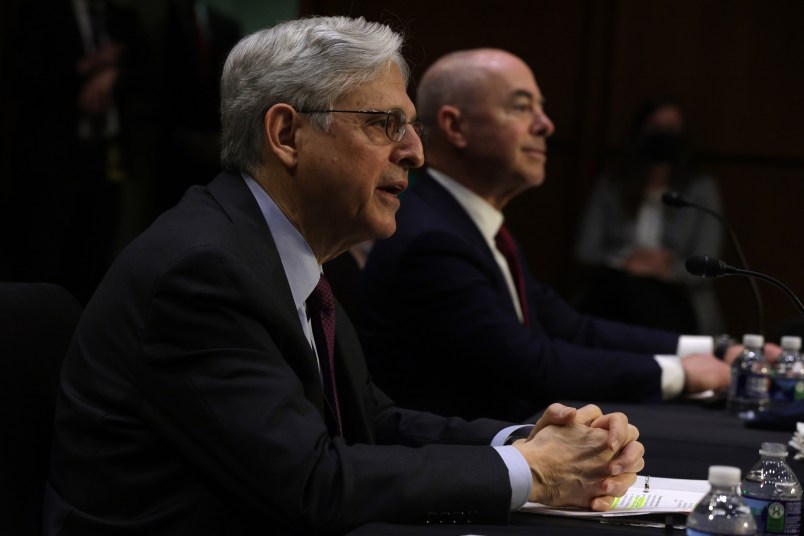Senate Democrats on Wednesday sought answers from the Biden administration on whether former President Donald Trump posed a national security threat to the country by continuing to spew lies about the 2020 election.
In response, two top law enforcement officials in the administration — Attorney General Merrick Garland and Homeland Security Secretary Alejandro Mayorkas — didn’t go after Trump by name, but rather told the Senate Appropriations Committee more generally that the sort of lies he’s told could propel further violence.
Sen. Chris Van Hollen (D-MD) made the most direct attempt of the entire committee hearing Wednesday to get the administration on the record.
He read from a March report from the Office of the Director of National Intelligence, which noted that developments including the Capitol breach “will almost certainly spur some [domestic violent extremists] to try to engage in violence this year.”
Both Garland and Mayorkas said they agreed with that report. But when Van Hollen went farther — quoting Rep. Liz Cheney (R-WY), who said Tuesday that Trump’s lying about the election “risks inciting further violence” — the administration officials weren’t willing to single out Trump specifically.
“False narratives create a lack of confidence in our democratic institutions, and sometimes worse,” Mayorkas said simply.
It’s not unreasonable that Garland and Mayorkas would hesitate to name Trump: Both officials are dealing with the fallout of the Jan. 6 Capitol attack, and any comment about the former President could open them up to criticism that political bias is influencing their decisions.
Garland, for example, declined to discuss the dozens of Capitol riot defendants who’ve explicitly cited Trump’s influence on their actions.
“I don’t think it’s an appropriate thing for me, as supervising those prosecutions, to make any comments outside of the court record,” he said.
But, without naming Trump, the attorney general was willing to speak in general about factors that have contributed to violent extremism.
“It is right, as the intelligence community has reported, that particularly those who end up committing acts of domestic violence get ideas from the internet, and from statements, where there are false narrative and false statements, those are the kinds of things that can, depending upon the person in the end who acts out, lead to violence,” Garland said.
Van Hollen’s questions followed a few minutes after those of Sen. Jeanne Shaheen (D-NH), who pressed Mayorkas on whether public officials’ statements about the 2020 election being stolen contributed to the threat of violence.
“The spread of false narratives are used to fuel extremist ideologies, and we are focused on the connection between extremist ideologies and the threat or intention to commit acts of violence,” Mayorkas said, adding later: “False narratives attributed to public officials gain traction in social media.”










